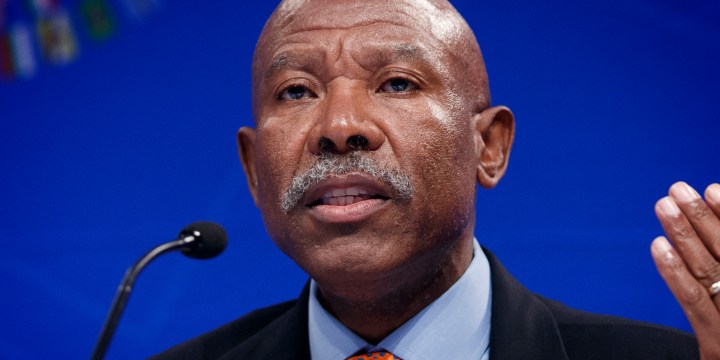BUSINESS MAVERICK
To cut rates, or not to cut: SARB has a lot to digest ahead of its policy committee meeting

The massive second-quarter GDP contraction and a slew of other data suggest that the South African Reserve Bank (SARB) has room to cut rates further when its Monetary Policy Committee (MPC) meets from Tuesday to Thursday this week. Market expectations are fairly divided.
The MPC has a lot to digest this week as it weighs up its options ahead of Thursday 17 September, when its decision on interest rates is made. A Reuters poll found that 15 economists expect the SARB’s main lending rate, or repo rate, to remain unchanged at 3.50%, while 10 expect a 25 basis point cut to 3.25%.
The MPC has slashed 300 basis points so far this year in an unprecedented round of monetary loosening in the face of Covid-19. The scale of the unfolding catastrophe it has faced is now clear after data last week showed the economy Q2, the period from the start of April to the end of June, contracted by 51% on an annualised basis and 16.4% compared with the previous quarter.
The SARB’s last forecast for all of 2020 was for a 7.3% GDP contraction and that is likely to be revised to an even bigger shrinkage. Many economists expect the economy to tank by more than 10% this year. More jobs losses are expected in an economy with an unemployment rate of 30%, worsening poverty levels and South Africa’s already stark income and wealth disparities. And inflation is not a burning concern at the moment. It was running at 3.2% in July, near the bottom of the 3% to 6% range the SARB is mandated to target.
This certainly gives the SARB plenty of ammunition to lower rates again. The impact of the cuts it has made so far appear to be muted. For example, central bank data from two weeks ago showed growth in private sector credit in South Africa in July braked to 5.12% year on year from a revised 5.63% in June, the fourth consecutive month that the number has slowed. But it is probably also the case that without the cuts, growth on this front may have slowed even further or perhaps tipped into decline.
And the bulk of the economy was in effect locked down during Q2 and so there was little that monetary policy could do to stimulate activity then. The economy has since largely reopened and so the lower rates are hopefully acting as a stimulus now by relieving the debt burdens of consumers, households and businesses.
“The nature of the crisis has hampered the transmission of monetary stimulus, so the impact of recent cuts could only emerge in coming months,” NKC African Economics noted in a market commentary.
This also means that while more cuts may be on the table, the aggressive cycle is over.
“You could probably argue that the bulk of what they can do has been done. This is now tweaking the policy at the margins,” George Glynos, head of research and analytics at ETM Analytics, told Business Maverick.
The MPC has plenty of other fat to chew on. SARB Governor Lesetja Kganyago has throughout the crisis defended the SARB’s independence and commitment to inflation targeting. But seismic monetary policy events elsewhere are changing the conversation. The Federal Reserve recently switched its focus from inflation to strong labour markets – a move that would certainly have support here among the ANC’s labour allies. It will be interesting to see what if anything the MPC statement has to say on that development. DM/BM



















 Become an Insider
Become an Insider
I have brought up this subject before, however it seems the salient points are constantly being avoided.
Yes, I do understand the need for interest rate cuts but it seems as if no account is being taken of the pensioners and all those who rely on their savings and interest from the banks and other investments to survive.
Their income has obviously been severely curtailed as a result of these cuts.
What if anything is being done to help these people, or is it simply easier and more convenient to ignore their plight totally?